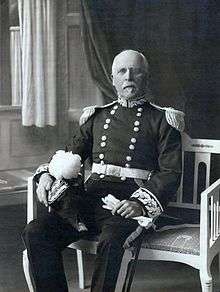George Chamberlin
Sir George Moore Chamberlin (1846–1928) was a prominent Norfolk businessman. The firm of Chamberlin & Sons (created in 1815) owned a large department store in Guildhall Hill in Norwich, as well as a textile factory in Botolph Street which specialised in the manufacture of waterproof clothing.[1][2]

Business career
As well as being managing director of the extensive family firm,[3] which not only ran the huge drapers' and furnishers' shop but also several clothing and carpet factories in the city, he also was director of other business in Norwich, including Norwich Union Life and Fire Offices[4] and the Norwich Electric Tramways Company,[5] as well as businesses in London including Swan & Edgar in Regent Street,[6] and hotels in Bournemouth and Brighton.
Political career
Sir George (he was knighted in 1919) was described as "a strong Conservative"; he was for many years leader of the party in Norwich.[4] He was three times Chief Magistrate of Norwich[4] as well as Sheriff, Mayor of Norwich (1891), Deputy Lord Mayor and Lord Mayor of Norwich (1916 and 1918), and Deputy Lieutenant and High Sheriff of Norfolk (1926).[7] He was heavily involved in charitable and philanthropic institutions, including the Association of Trade Protection Societies of which he was president for 25 years.[4]
Notes
- Joyce Gurney-Read (1987), amended by Nick Williams (2008), Chamberlins of Norwich, Norwich Heritage Economic & Regeneration Trust. Retrieved 24 October 2015
- DEYES, Margaret (1995). Our Norkfolk Kinsfolk. Norwich Archives.
- BURGESS, Edward & Wilfred E. (1904). Men who have made Norwich. Norfolk Industrial Archaeology Society. pp. 9, 10, 11. ISBN 9780-9526815-4-0.
- "DEATH OF SIR GEORGE CHAMBERLIN". YBury Free Press. 18 August 1928. Retrieved 24 October 2015 – via British Newspaper Archive.
- Roger Ryan, "Banking and Insurance", in Carole Rawcliffe, Richard Wilson, Christine Clark (eds), Norwich Since 1550. A&C Black, 2004. Page 383. ISBN 1852854502
- "RECENT WILLS". Yorkshire Post and Leeds Intelligencer. 20 October 1928. Retrieved 24 October 2015 – via British Newspaper Archive.
- "The Mayors, Lord Mayors and Sheriffs of Norwich, Norfolk". Archived from the original on 2007-08-14. Retrieved 2008-01-05.